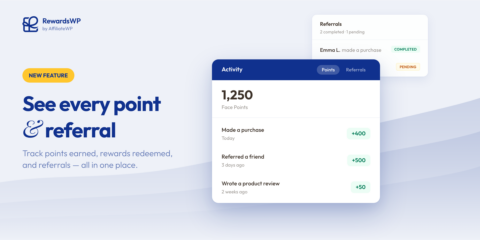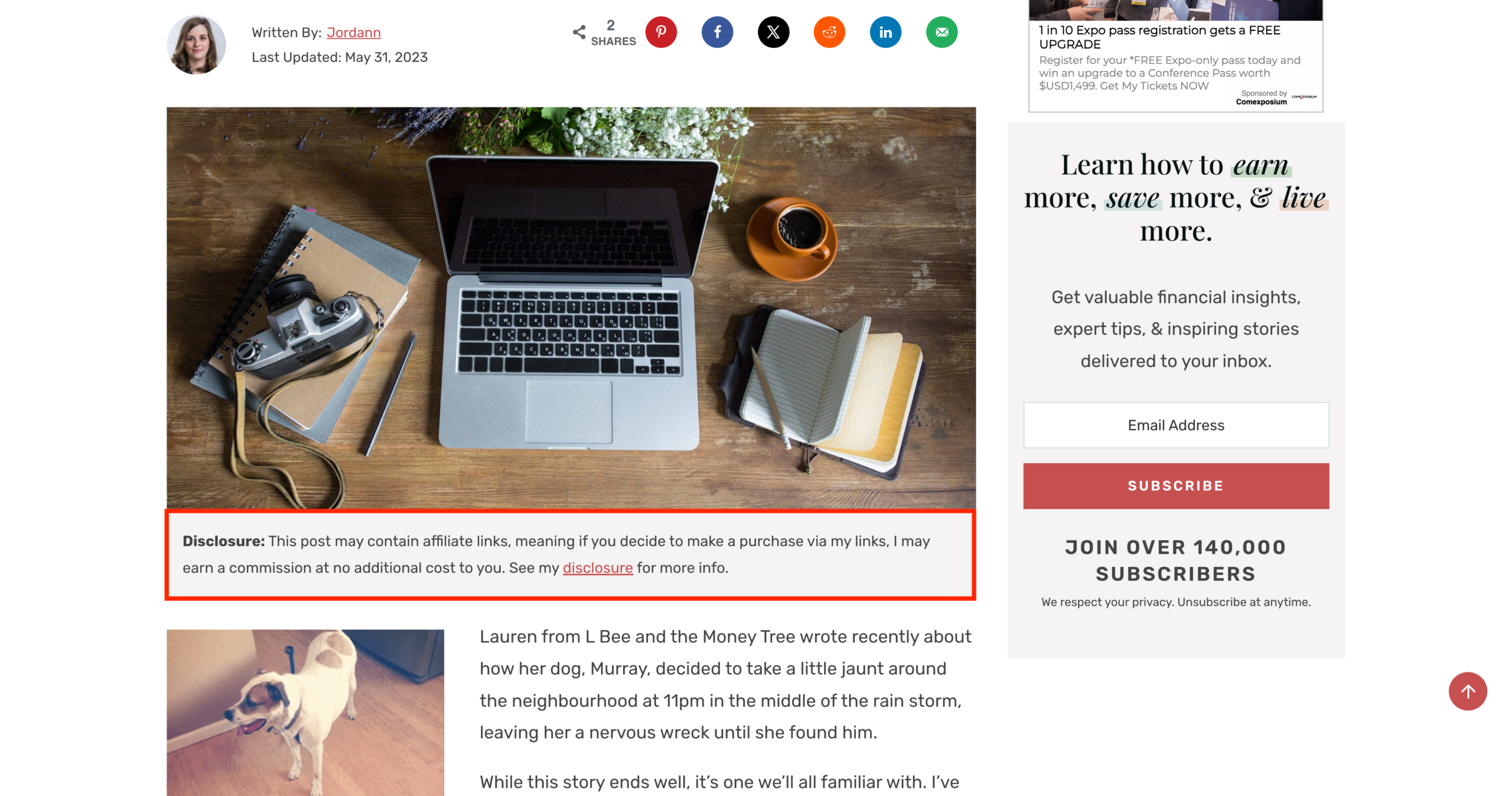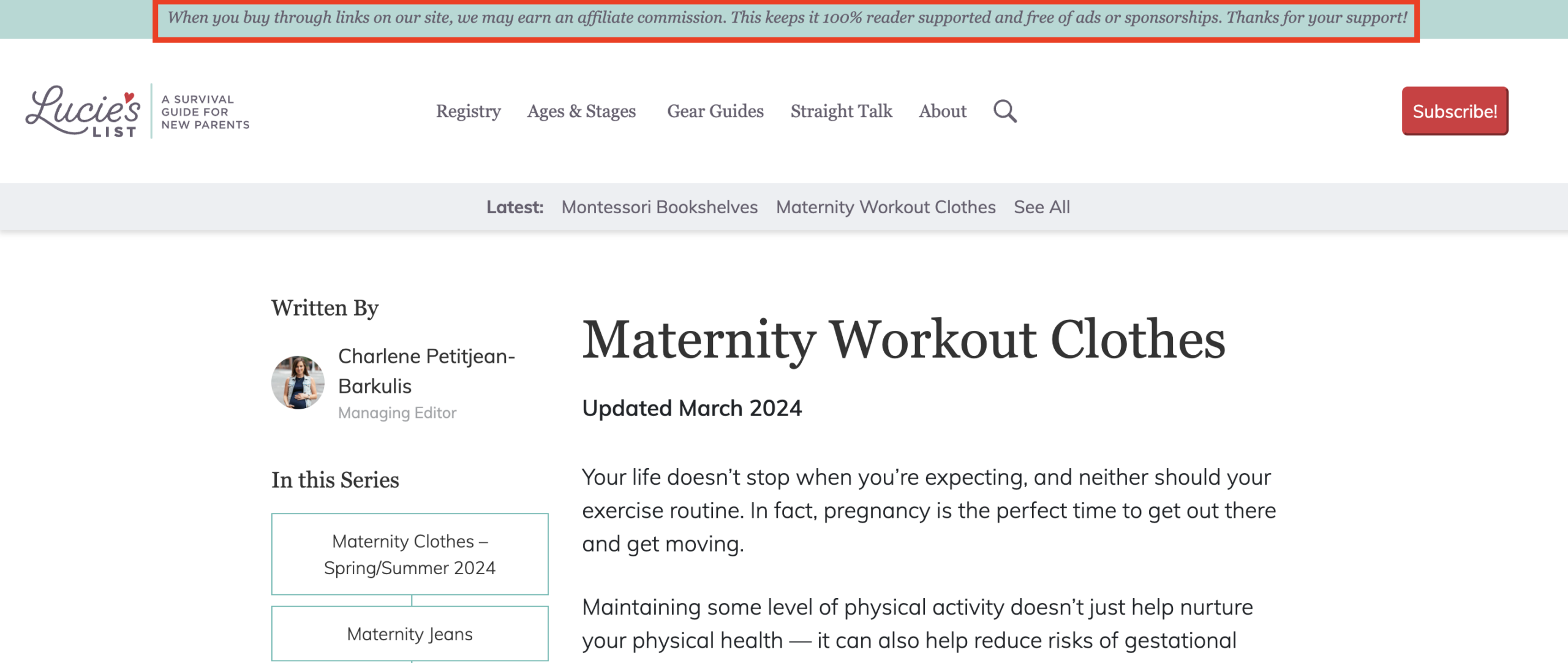
Your Customers Have Points. Now They Have Proof.
Rewards Activity gives your customers a full points history and real-time referral tracking, right inside the rewards widget. Available on all RewardsWP plans.
Continue Reading →
Rewards Activity gives your customers a full points history and real-time referral tracking, right inside the rewards widget. Available on all RewardsWP plans.
Continue Reading →
Want to know what an Affiliate Link Disclosure is?
Using clear and proper affiliate link disclosures is important. Without them, you might face legal issues and lose trust with your audience.
In this guide, we’ll explain what a proper affiliate link disclosure is and why it’s important.
This will help you build trust with your audience and comply with regulations.
Let’s get started!
An affiliate link disclosure is a statement that informs your audience that you earn a commission if they purchase a product through your link. This is important for transparency and trust.
Let’s say, if you write a blog post recommending a product and include an affiliate link, you need to tell your readers that you’ll earn a commission if they buy the product through your link.
Example:
Let’s say you run a blog about fitness. You write a review about a new protein powder and include an affiliate link to buy it.
Your disclosure might look like this:
“Disclosure: This post contains affiliate links. If you make a purchase through these links, I may earn a small commission at no extra cost to you. I only recommend products I personally use and trust.”
This simple statement helps your audience understand that you benefit from their purchases, promoting transparency and building trust.
Let’s start with the most important reason to use affiliate link disclosures: consumer protection.
The internet can be a little bit like the Wild West sometimes. If we wanted to, we could all create a website and start reviewing any product we want to right now. Using paid advertising, we could reach a large audience in just a few days.
All of this is done without any knowledge of the products we’re reviewing; it’s just the goal of making affiliate sales.
This is bad for businesses and for everyone who uses the internet.
Consumers end up with poor-quality, biased information, and publishers and sellers have bad reputations.
Affiliate disclosures help to combat this by highlighting that websites have a vested interest in the links they send people to. This gives the public a complete picture, allowing them to decide whether or not to click the link.
As the FTC says, “If you disclose your relationship to the retailer clearly and conspicuously on your site, readers can decide how much weight to give your endorsement.”
Affiliate marketers understand this, but if there’s nothing to enforce a fair playing field, it’s difficult to get people’s buy-in, which is where the FTC’s disclosure statement regulations come in.
Don’t overthink it!
An affiliate disclosure needs to be easy to understand and quickly highlight a relationship between your business and the links you’re using, not a literary masterpiece.
What’s more important is ensuring people can access the affiliate link disclosure easily. Here are some tips to help you write an affiliate link disclosure that protects your users and keeps you compliant.
Your affiliate link disclosure is all about presenting people with clear information. Here’s what the FTC’s guide says:

It’s important to remember that the affiliate disclosure is in your best interest, so there’s no point in trying to hide it with little tricks. Be open and honest, and your users will respond to this.
You can have a perfectly worded affiliate link disclosure, but if nobody sees it, then it’s of no use. Where you put your affiliate disclosure is just as important as what you put in it, and it’s generally accepted that the best place for it is at the top of your blog post.
Again, the FTC provides some guidance on this:

Whatever page someone lands on, they should be aware that the content they’re seeing might contain affiliate links, and the best way to do this is by highlighting it at the top of the page.
Remember also that sidebars and footers don’t necessarily show on mobile, so they’re not ideal places for affiliate disclosures.
An affiliate disclosure doesn’t have to be bland. It’s your website, so give it your personality and stay within the rules.

Every inch of your website is a marketing opportunity, so why should your affiliate link disclosures differ? Keep it simple, but use it as an opportunity to build your relationship with the reader.
The FTC’s rules cover social media in just the same way as your blog. Any recommendations you make should be preceded by a disclosure (if you receive compensation).
Influencer marketing has grown exponentially in recent times, and while the FTC regulations were updated back in 2009, many prominent influencers still fail to disclose sponsored posts.
The FTC can’t police the entire internet, but organizations are starting to crack down on these practices.
Whether you’re participating in a huge affiliate program like Amazon Associates, or a small one for an individual website, they’ll all have their own terms and conditions.
Some might have specific requirements for your affiliate link disclosure, so it’s always worth carefully reading the terms and conditions.
For instance, Amazon’s affiliate program states:

These rules are there to protect the vendor’s reputation and ensure they comply with their obligations, but they also help you build trust and authority with your audience.
We’ve picked out various examples to help you get a feel for what your affiliate link disclosures should look like.
As you’ll see, the key theme is simplicity.

This affiliate links disclosure from Making Sense of Cents ticks the two most important boxes: clarity and prominence.
It explains what affiliate links are in simple language, and because it’s right under the title, it’s hard to miss. It also directs people to learn more about the site’s affiliate policy by clicking the disclosure link.
Simple, to the point, and clear, exactly what your users need.

Another example of a simple, straight-up affiliate link disclosure from a successful affiliate marketing site is The Points Guy.
Again, the disclosure is right at the top of the page, easy to read, and written in simple language. It immediately makes readers aware that the publisher receives compensation when people click certain links.

Lucie’s List is a successful affiliate website that helps prepare expectant parents for parenthood.
Its affiliate link disclosure is an interesting example because it’s built into a bar at the top of the theme. This shows that being extremely upfront and honest by making your disclosures highly prominent can work.
We also like this one for the personal touch with the “thanks for your support” signoff.

We like GearLab’s affiliate disclosure because it’s open and honest.
It’s nicely incorporated into the theme at the top of the page, and it tells a story. Yes, they get paid when someone purchases a product through their link, but each product is independently tested, and free products do not sway them.
It tells the user what they need to know.
If you run your affiliate program, then disclosures are an important topic.
You want to work with trustworthy affiliates who have great relationships with their readers; openness about compensation is an important part of this.
Like it or not, your affiliates reflect on your brand, so you must establish rules for your affiliate program.
This will be detailed in your terms and conditions, but make sure you don’t just set rules but educate as well.
Tell your affiliates why affiliate disclosures are important, give them access to the information they need, and offer suggestions.
With the right affiliate marketing software, you should have all the tools you need to build your affiliate relationships and give people access to everything they need to reflect your brand in the best possible way.
Through good communication and onboarding, you can clearly set your expectations and ensure affiliates follow best practices on disclosures.
We all want to be able to trust the information we’re reading online. Affiliate link disclosures help us do that by highlighting when publishers receive compensation for their content.
Additionaly, if you’re looking to scale your online business you should consider investing in a robust affiliate management plugin like AffiliateWP.
Use the AffiliateWP’s growth tools and grow your business revenue with the help of an affiliate program.
Want to learn more? Check out these resources:
Now, it’s time to make the decision and grow your business.
Disclosure: Our content is reader-supported. This means if you click on some of our links, then we may earn a commission. We only recommend products that we believe will add value to our readers.
Launch your affiliate program today and unlock a new revenue channel to grow your business faster.
We use cookies to improve your experience on our site. By using our site, you consent to cookies.
Manage your cookie preferences below:
Essential cookies enable basic functions and are necessary for the proper function of the website.
Statistics cookies collect information anonymously. This information helps us understand how visitors use our website.
Marketing cookies are used to follow visitors to websites. The intention is to show ads that are relevant and engaging to the individual user.